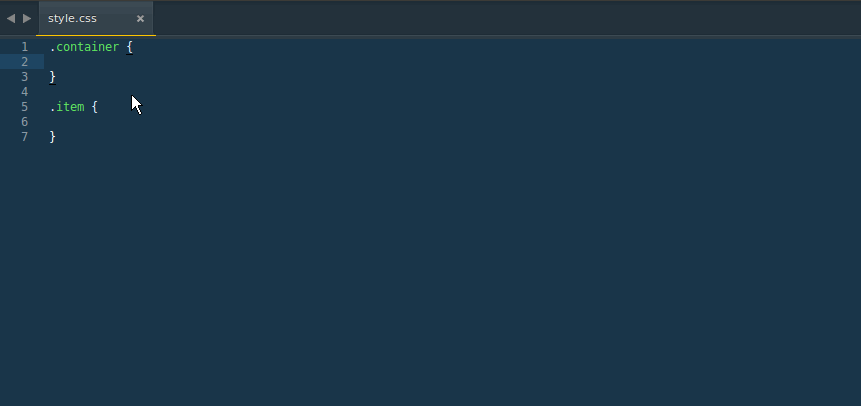Flexbox Snippets
CSS Flexbox snippets for Sublime
Details
Installs
- Total 17K
- Win 11K
- Mac 5K
- Linux 2K
| Feb 2 | Feb 1 | Jan 31 | Jan 30 | Jan 29 | Jan 28 | Jan 27 | Jan 26 | Jan 25 | Jan 24 | Jan 23 | Jan 22 | Jan 21 | Jan 20 | Jan 19 | Jan 18 | Jan 17 | Jan 16 | Jan 15 | Jan 14 | Jan 13 | Jan 12 | Jan 11 | Jan 10 | Jan 9 | Jan 8 | Jan 7 | Jan 6 | Jan 5 | Jan 4 | Jan 3 | Jan 2 | Jan 1 | Dec 31 | Dec 30 | Dec 29 | Dec 28 | Dec 27 | Dec 26 | Dec 25 | Dec 24 | Dec 23 | Dec 22 | Dec 21 | Dec 20 | |
|---|---|---|---|---|---|---|---|---|---|---|---|---|---|---|---|---|---|---|---|---|---|---|---|---|---|---|---|---|---|---|---|---|---|---|---|---|---|---|---|---|---|---|---|---|---|
| Windows | 0 | 0 | 0 | 0 | 0 | 0 | 0 | 0 | 0 | 0 | 0 | 0 | 0 | 0 | 0 | 0 | 0 | 1 | 0 | 0 | 0 | 0 | 0 | 0 | 0 | 0 | 0 | 0 | 0 | 0 | 0 | 0 | 0 | 1 | 0 | 0 | 0 | 0 | 0 | 0 | 0 | 0 | 0 | 1 | 0 |
| Mac | 0 | 0 | 0 | 0 | 0 | 0 | 0 | 0 | 0 | 0 | 0 | 0 | 0 | 0 | 0 | 0 | 0 | 0 | 0 | 0 | 0 | 0 | 0 | 0 | 0 | 0 | 0 | 0 | 0 | 0 | 0 | 0 | 0 | 0 | 0 | 0 | 0 | 0 | 0 | 0 | 0 | 0 | 0 | 0 | 0 |
| Linux | 0 | 0 | 0 | 0 | 0 | 0 | 0 | 0 | 0 | 0 | 0 | 0 | 0 | 0 | 0 | 0 | 0 | 0 | 0 | 0 | 0 | 0 | 0 | 0 | 0 | 0 | 0 | 1 | 0 | 0 | 0 | 0 | 0 | 0 | 0 | 0 | 0 | 0 | 0 | 0 | 0 | 0 | 0 | 0 | 0 |
Readme
- Source
- raw.githubusercontent.com
CSS Flexbox snippets for Sublime 

Install
To install through Package Control, search for Flexbox Snippets. If you still don't have Package Control in Sublime Text, go get it. If you insist to not install it, you can download the package and put it manually inside your Pacakages directory. It should work but will not update automatically.
Snippets
Works for CSS/LESS/Sass/SCSS/Stylus & Vue Component.
display
trigger: flexbox⇥
display: ${1:flex|inline-flex};
flex-direction
trigger: flexdir⇥
flex-direction: ${1:row|row-reverse|column|column-reverse};
flex-wrap
trigger: flexwrap⇥
flex-wrap: ${1:nowrap|wrap|wrap-reverse};
flex-flow
trigger: flexflow⇥
flex-flow: ${1:<'flex-direction' (row|row-reverse|column|column-reverse)> || <'flex-wrap' (nowrap|wrap|wrap-reverse)>};
justify-content
trigger: flexjust⇥
justify-content: ${1:flex-start|flex-end|center|space-between|space-around};
align-items
trigger: flexitems⇥
align-items: ${1:flex-start|flex-end|center|baseline|stretch};
align-content
trigger: flexcont⇥
align-content: ${1:flex-start|flex-end|center|space-between|space-around|stretch};
order
trigger: flexorder⇥
order: ${1:0};
flex-grow
trigger: flexgrow⇥
flex-grow: ${1:0};
flex-shrink
trigger: flexshr⇥
flex-shrink: ${1:1};
flex-basis
trigger: flexbasis⇥
flex-basis: ${1:auto|<'width' (%|rem|em|px)>};
flex
trigger: flex⇥
flex: ${1:none|auto|[<'flex-grow' (0)> <'flex-shrink' (1)> || <'flex-basis' auto|<'width' (%|rem|em|px)>>]};
align-self
trigger: flexself⇥
align-self: ${1:auto|flex-start|flex-end|center|baseline|stretch};
Prefixing Flexbox
Flexbox requires some vendor prefixing to support the most browsers possible. It doesn't just include prepending properties with the vendor prefix, but there are actually entirely different property and value names. This is because the Flexbox spec has changed over time, creating an “old”, “tweener”, and “new” versions.
Perhaps the best way to handle this is to write in the new (and final) syntax and run your CSS through Autoprefixer, which handles the fallbacks very well.
Contributing
If you want to help, please read the Contributing guide.
History
For detailed changelog, see Releases.
References
License
MIT License © Breno Polanski
